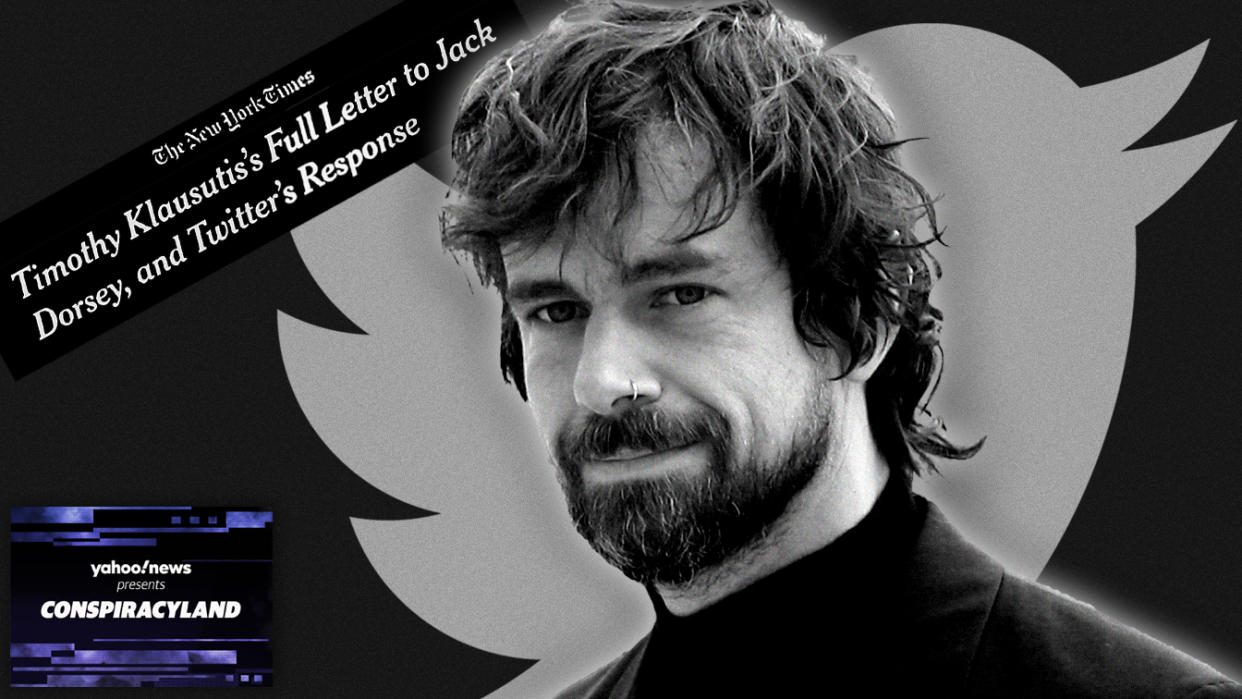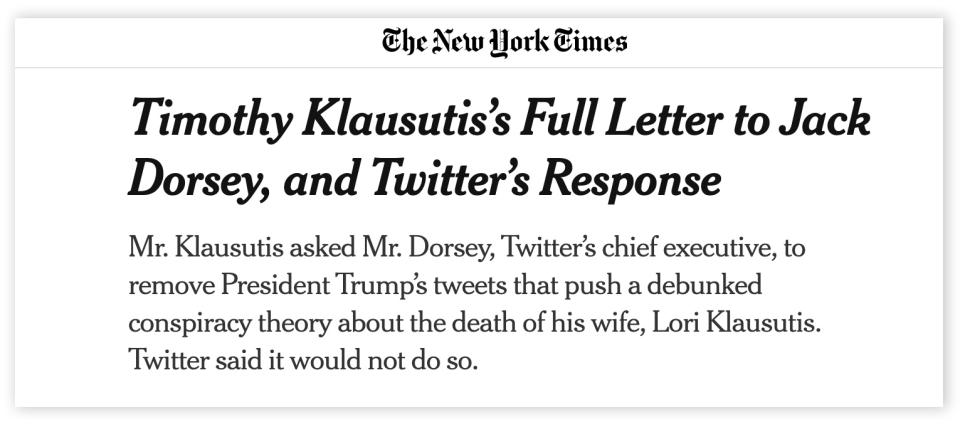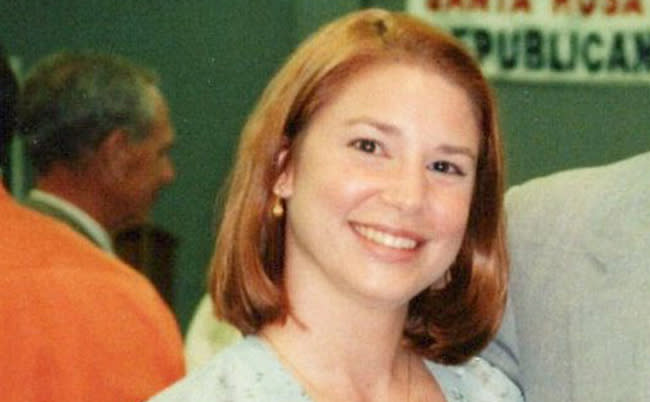The letter that shook Twitter's world
- Oops!Something went wrong.Please try again later.

This is the third and final part in the Yahoo News “Conspiracyland” podcast series “A Death in Florida.” Read and listen to the first two parts here and here.
“What would the president have to say on Twitter to be kicked off?”
That’s what columnist Andrew Ross Sorkin asked Jack Dorsey at a New York Times DealBook Conference in November 2017. By then, Donald Trump’s penchant for tweeting false claims — for example, that President Barack Obama had “wiretapped” his Trump Tower office — was well known. But what wasn’t well known was what Dorsey, Twitter’s co-founder and CEO, said in response: The company had an internal policy it had never publicized. Elected leaders like Trump were exempt from Twitter’s “terms of service” banning false or demeaning claims because whatever they wrote was newsworthy and of “public interest.”
As Twitter elaborated two months later: “Blocking a world leader from Twitter or removing their controversial Tweets would hide important information people should be able to see and debate.”
That policy got tested to its outer limits this year when Trump launched a bizarre series of tweets suggesting that one of his media critics, MSNBC host Joe Scarborough, had an illicit affair with a staffer, Lori Klausutis, and then murdered her in July 2001. There was no evidence to support Trump’s conspiratorial claims, and they generated strong pushback from Scarborough. “The cruelty is unspeakable,” he said on his show, “Morning Joe.”
Trump’s claims also outraged T.J. Klausutis, Lori’s widower, who speaks out for the first time on the new season of Yahoo News’ “Conspiracyland” podcast, “A Death in Florida.” Klausutis talks about the “inhuman” pain and anguish that the conspiracy theories about his wife’s death have caused him and her family — and about how he came to write his poignant letter to Dorsey in May, pleading with him to take down the president’s false and offensive tweets.
Subscribe and download: “Conspiracyland” on Apple Podcasts
“I am now angry as well as frustrated and grieved,” he wrote. “I’m asking you to intervene in this instance because the President of the United States has taken something that does not belong to him — the memory of my dead wife — and perverted it for perceived political gain.”
How Twitter responded to Klausutis’s letter is the subject of the last episode of the new “Conspiracyland” season, released Thursday. Ever since Twitter was launched in 2007 as a message board for users to communicate in 140-character posts, the platform has been guided by the core values of its libertarian-minded founders: to promote and facilitate free speech, not to censor it. It was a guiding principle that company executives reveled in during the Arab uprisings of 2010 and 2011, when protesters used Twitter to spread their pro-democracy messages throughout the Middle East.
“It was coming off of the heels of the Arab Spring, where Twitter was taking credit for bringing people together and the rise of democracy around the world, because information can be shared,” said Vivian Schiller, who served as the company’s chief of media partnerships in 2013 and 2014. “And the ethos at the time was … ‘Twitter is the free speech wing of the free speech party.’ And I remember the time when I joined Twitter, feeling very proud of that ethos because I thought, ‘Isn’t this a remarkable thing. This is going to democratize information and give everybody around the world a voice.’”
But over time — as hate speech, disinformation and conspiracy theories began to proliferate on the platform — Schiller came to change her view, she said on the “Conspiracyland” podcast. “I look back now, and my God, the naivete of not really understanding what that could lead to is mind-boggling now in hindsight,” she said.
By the spring of 2020, Trump was issuing tweetstorms of false claims about election fraud, the coronavirus pandemic and many other things. But perhaps most of all, the fallout from Klausutis’s heartfelt letter about his dead wife — leaked to Kara Swisher, co-founder of the technology news website Recode, who published it in the New York Times — was intense. When Twitter had its annual shareholder conference on May 27, the subject of Trump’s claims about Scarborough came up a number of times — and Dorsey was once again in the hot seat.

“In my opinion, President Trump used Twitter to cause pain to a private family,” one shareholder said to Dorsey at the meeting, a comment that was read to him by the moderator of the event. “Will you protect freedom of the press here, and end Donald Trump’s ability to use Twitter to agonize a private family, by deleting his tweets that accuse Scarborough of murder? And if not, why not?”
Dorsey, in response, expressed sorrow for the pain caused to T.J. Klausutis and Lori’s family, but he once again reverted to that internal Twitter policy he had disclosed more than two years earlier: Elected leaders like Trump get a largely free pass on the platform — because what they have to say contributes to a democratic “dialogue.” (While refusing to take down the president’s posts, Twitter, in a separate statement, said it was working to “expand existing product features and policies so we can more effectively address things like this going forward.”)
“We feel terrible for what the family is going through as a result of these actions and these behaviors,” Dorsey said at the shareholder meeting. “We also believe that it’s important that people have conversations around what’s happening, especially with our global leaders.”
When we played that response to T.J. Klausutis, he recoiled at the idea that Trump’s tweets about his dead wife were part of a legitimate “conversation” for the public to have with their president.
“Well, that’s a bunch of bullshit,” he replied. “This was not an issue that was important to our society whatsoever. This had no social value. This had nothing to do with how we run this country, how we want to be as a society. This was a petty attack on another individual, using any means necessary, and it was demonstrably false.

“I’m not against free speech by any stretch of the imagination, but … how was this issue of any importance to anything that’s going on in our world or country today?”
Klausutis never got a response to his letter to Dorsey, who declined to be interviewed for “Conspiracyland.” Twitter also has not taken down the tweets about Lori Klausutis. (A spokesman, Nicholas Pacilio, told Yahoo News that the expanded “product features and policies” the company promised in May in response to T.J. Klausutis’s letter and that relate to “personal allegations” and “conspiracy theories” have yet to be implemented. “That process is still underway,” he said.)
And yet, for all of Twitter’s intransigence, there are signs that the protests of T.J. Klausutis may be getting heard after all. The day after his letter went public, Twitter did something it hadn’t done before — it flagged two other Trump tweets, about election fraud, as “potentially misleading” and linked to articles correcting them. In the weeks that followed, the company flagged five additional tweets with warning labels, including one containing a manipulated video. It hid another Trump tweet that seemed to threaten protesters with getting shot by federal agents, attaching an advisory that the post violated its policies forbidding abusive behavior. And in July it removed more than 7,000 accounts linked to QAnon — the bizarre conspiracy cult whose followers had echoed and amplified Trump’s tweets about Lori Klausutis.
As Twitter took these actions, Facebook, Reddit, Snap and other social media companies also started getting more aggressive, removing or labeling posts by the president and his followers.
Roger McNamee, one of the original investors in Facebook and a sharp critic of the social media companies, said this was no coincidence: T.J. Klausutis’s letter came at just the right moment — when the social media giants were facing pressure from all quarters to purge the pollution on their platforms.

“T.J.’s letter was perfectly timed,” he said. “It followed a pandemic, an economic collapse and the murder of George Floyd, which collectively have caused the country to go through a period of self-reflection. And into that moment of self-reflection, T.J. launched his letter. And for the first time in memory, people in the United States are being honest with themselves about hate speech, being honest with themselves about the damage conspiracy theories can do. … I believe a year from now we have a very good chance to be in a much better place relative to the behavior of internet platforms. … And T.J.’s letter will have made a contribution to that.”
While the companies have said their new policies have been in the works for some time, journalist Kara Swisher believes that Klausutis’s letter — and the attention it received after she publicized it — may well have egged them on, or given them some backbone to do what many inside them had wanted to do for some time.
“His letter was so heartfelt and so poignant and so clear and fair,” she said. “I think most people looked at it, including at the tech companies, and said, ‘What are we doing? What are we facilitating? What’s going on?’”
Still, Klausutis remains conflicted.
“My letter having gotten out and all the other articles that followed, the opinion pieces that followed that week, I think that groundswell really left them in a position where they had to do something,” he said. “And so I think, yeah, strangely enough, a simple letter, a well-written letter, or even a poorly written letter, you know, can change some history.”
But in the end, that may be small comfort for what he’s been through — and what he and the rest of Lori Klausutis’s family, her parents, her sisters and her nephews and niece, may yet have to endure well into the future with the conspiracy claims still easily accessible on the internet.
“They should never come across this type of crap,” T.J. Klausutis said. “I hope they never find it, but I’m not so naive. … They should never, ever, ever have to learn about this conspiracy version of who she was, because it was — I don’t know, somebody’s hobby or fascination or what.”
_____
Read more from Yahoo News:



